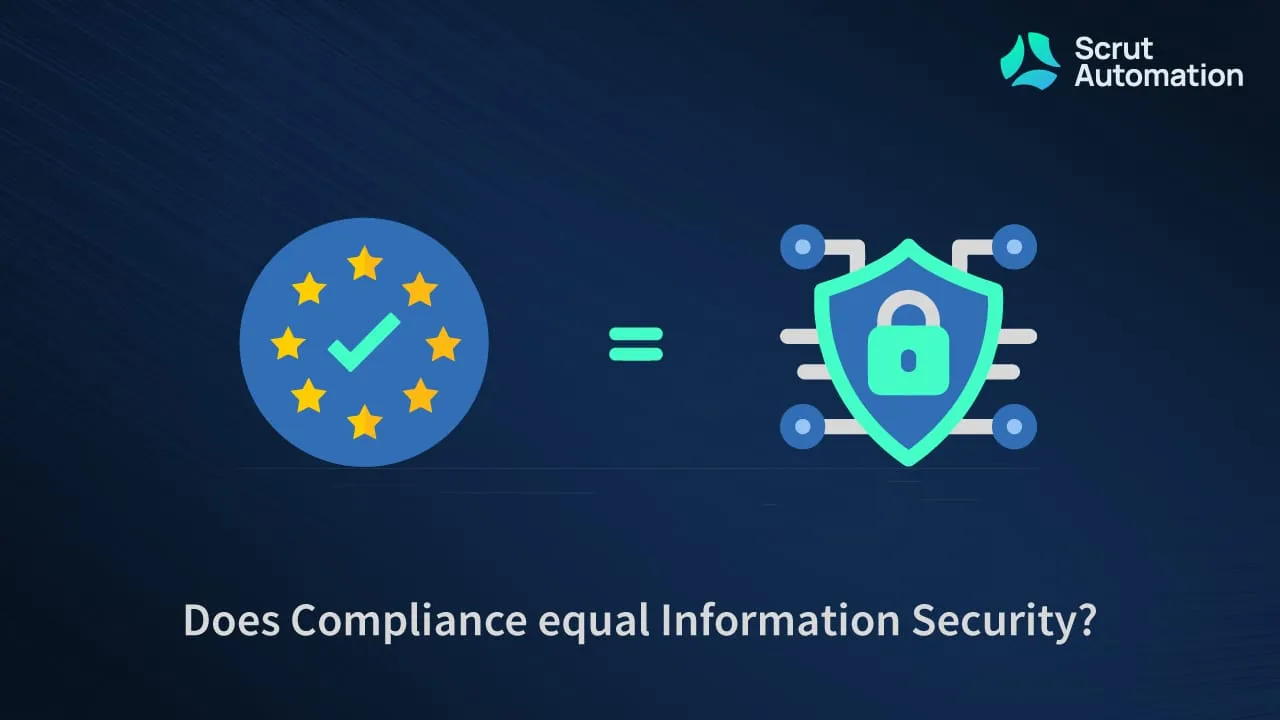When to bring in a GDPR auditor: Key indicators for success

The General Data Protection Regulation (GDPR) enforces stringent data privacy standards across the European Union, making non-compliance a significant risk for organizations. The consequences include hefty fines, reputational harm, and operational disruptions.
A recent example underscores this reality: In October 2024, LinkedIn was fined €310 million for processing personal data without a lawful basis for targeted advertising, demonstrating the high stakes involved.
GDPR compliance is essential for organizations to safeguard personal data and maintain customer trust. Auditors play a vital role by assessing data protection measures, verifying compliance with legal requirements, and identifying risks that could lead to breaches or regulatory violations.
Engaging auditors is particularly valuable when implementing new data processing activities, undergoing changes that impact data management, or preparing for regulatory reviews. Their expertise ensures compliance, mitigates risks, and strengthens data protection measures.
In this article, we will explore the complexities of GDPR compliance, the critical role of auditors, signs that your organization might need an audit, how to prepare, and how tools like Scrut can streamline and enhance the auditing process.
Section 1: Understanding GDPR compliance and its complexities
GDPR compliance is rooted in key principles like lawfulness, transparency, accountability, data minimization, and integrity, which guide how personal data is collected, processed, and protected. However, evolving technology such as artificial intelligence (AI), Internet of Things (IoT), and cross-border data transfers pose challenges to maintaining compliance.
Organizations often struggle with issues like incomplete data inventories, outdated policies, insufficient security measures, and mismanaged third-party relationships. Addressing these pitfalls proactively is essential to ensuring adherence to GDPR requirements.
Read also: GDPR cookie consent: Requirements & how to comply?
Section 2: The role of an auditor in GDPR compliance
Who is a GDPR auditor?
A GDPR auditor is a professional responsible for evaluating an organization's compliance with the GDPR. They assess how well an organization adheres to GDPR principles, including data protection, privacy policies, and security practices, and provide recommendations for improvement. They possess specific qualifications, skills, and experience, which will be explored in greater detail in the following section.
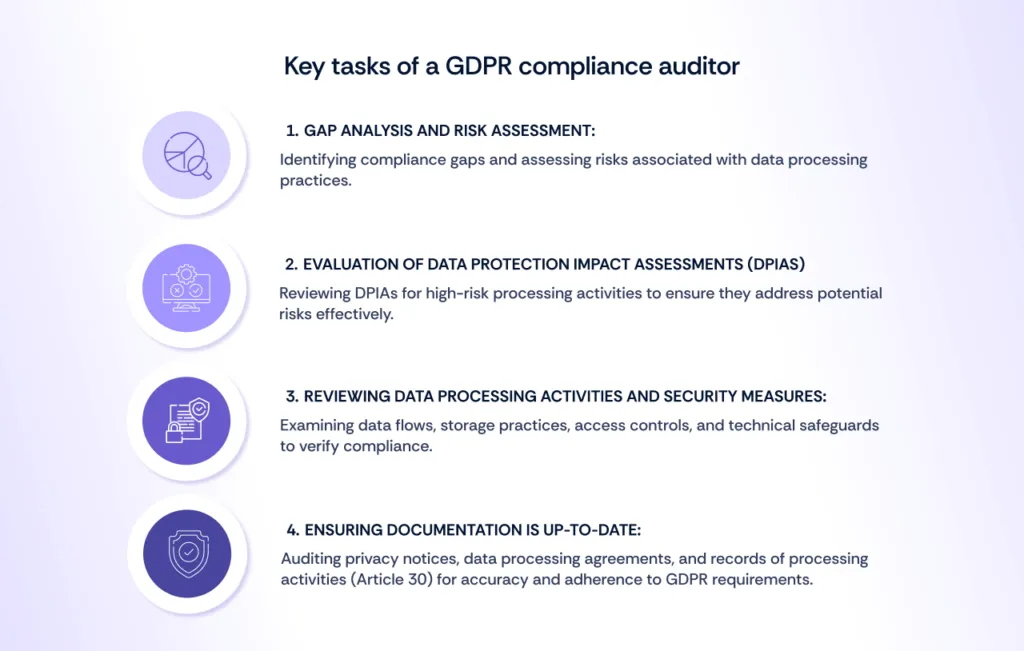
Value added by an external perspective
Bringing in an external auditor provides a neutral, unbiased assessment of your compliance status. Their specialized expertise ensures a thorough evaluation of risks and opportunities, offering actionable insights to strengthen your GDPR compliance program and mitigate potential regulatory penalties.
Read also: Debunking five common GDPR compliance myths
Section 3: Signs your organization needs a GDPR auditor
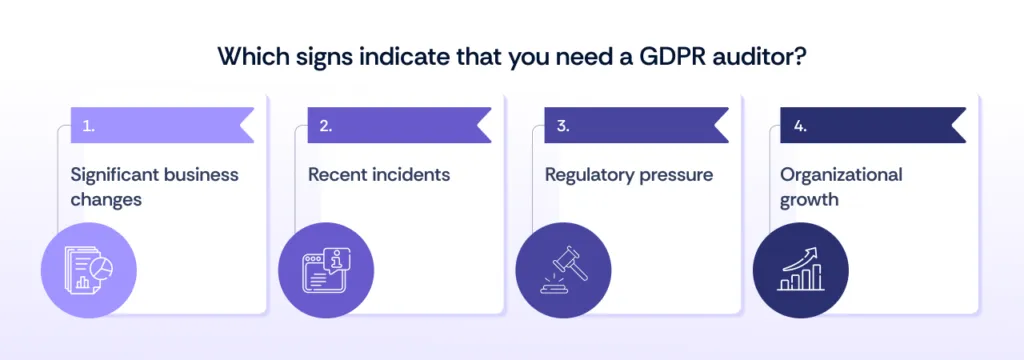
Bringing in a GDPR auditor can be a strategic decision when your organization faces situations that challenge its compliance framework. Key signs include:
Significant business changes
- Entering new GDPR-regulated markets: Expanding operations to jurisdictions under GDPR increases your compliance obligations, requiring audits to ensure adherence.
- Adoption of AI or advanced data analytics tools: These technologies often involve complex data processing, necessitating a review of your compliance posture, including DPIAs.
Recent incidents
- Data breaches or near misses: Even a minor breach can highlight vulnerabilities in your data protection practices, warranting an immediate audit to address gaps.
- Customer complaints regarding data practices: Complaints about privacy practices may indicate shortcomings in how personal data is managed or communicated.
Regulatory pressure
- Investigations or warnings from DPAs: If your organization is under scrutiny, an audit can provide a clear roadmap for remediation and demonstrate proactive compliance efforts.
Organizational growth
- Expanding data collection or processing operations: Scaling up often leads to new data flows, processors, or storage requirements, which need to be evaluated for GDPR compliance.
- Handling sensitive data types: If your organization processes sensitive data, such as health or financial information, ensuring compliance with higher standards is critical to avoid hefty penalties.
Recognizing these signs early and engaging a GDPR auditor can help your organization address risks, improve processes, and maintain a strong compliance posture in an increasingly complex regulatory environment.
Read also: Why GDPR compliance goes beyond a CISO's agenda?
Section 4: How to choose the right GDPR auditor
Skills and qualifications of GDPR compliance auditor:
- Certifications: Commonly hold credentials like Certified Information Privacy Professional/Europe (CIPP/E) or Certified Information Privacy Manager (CIPM).
- Regulatory expertise: Deep knowledge of GDPR requirements and sector-specific regulations.
- Analytical skills: Ability to analyze complex data flows and privacy practices.
- Communication: Proficient in explaining compliance requirements and audit findings to stakeholders.
Key considerations:
- Audit scope: Choose between tailored audits focused on your unique operations and general audits. Tailored audits often provide more actionable insights.
- Methodology: Ensure the auditor uses a comprehensive approach, including data mapping, evidence collection, and rigorous control testing.
- Sector-specific expertise: Prioritize auditors experienced in navigating industry-specific compliance requirements.
Red flags:
- Beware of generic or superficial assessments that fail to address your organization's unique compliance needs.
- Avoid auditors who cannot demonstrate a clear understanding of GDPR principles or your industry's specific challenges.
Read also: How GDPR affects Marketing
Section 5: How can Scrut help you in GDPR audits?
Scrut Automation offers a comprehensive platform designed to simplify and streamline GDPR compliance and audits for organizations of all sizes. Here's an overview of how Scrut can assist in your GDPR audit process:
Overview of Scrut's platform:
Scrut provides a centralized compliance management solution that extends beyond GDPR, enabling organizations to manage various compliance frameworks through a single interface. This unified approach facilitates efficient compliance management across multiple standards.
Key features:
- Automated evidence collection: Scrut integrates with over 70 commonly used applications to automate the collection of evidence required for compliance audits. This automation reduces manual effort and ensures that data is gathered consistently across systems.
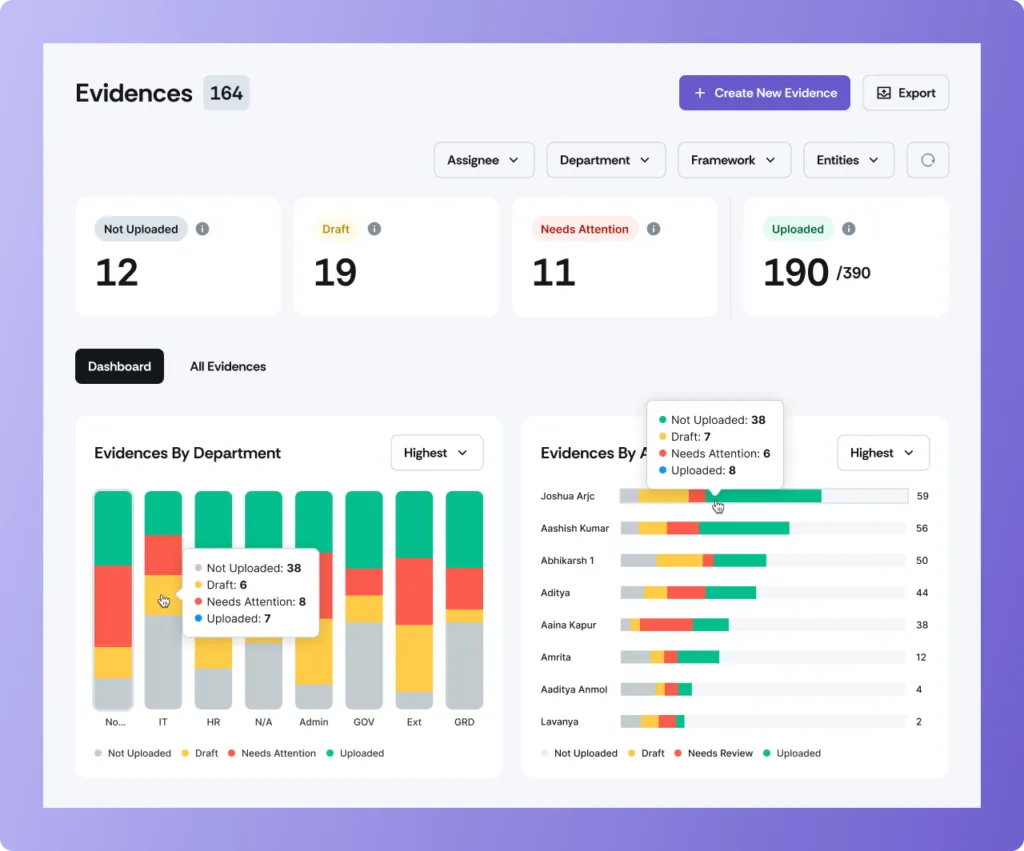
- Gap analysis tools: The platform enables organizations to conduct comprehensive GDPR gap analyses, including cloud risk assessments, control reviews, employee policy attestations, and vendor risk assessments. This helps identify areas of non-compliance and provides actionable insights for remediation.
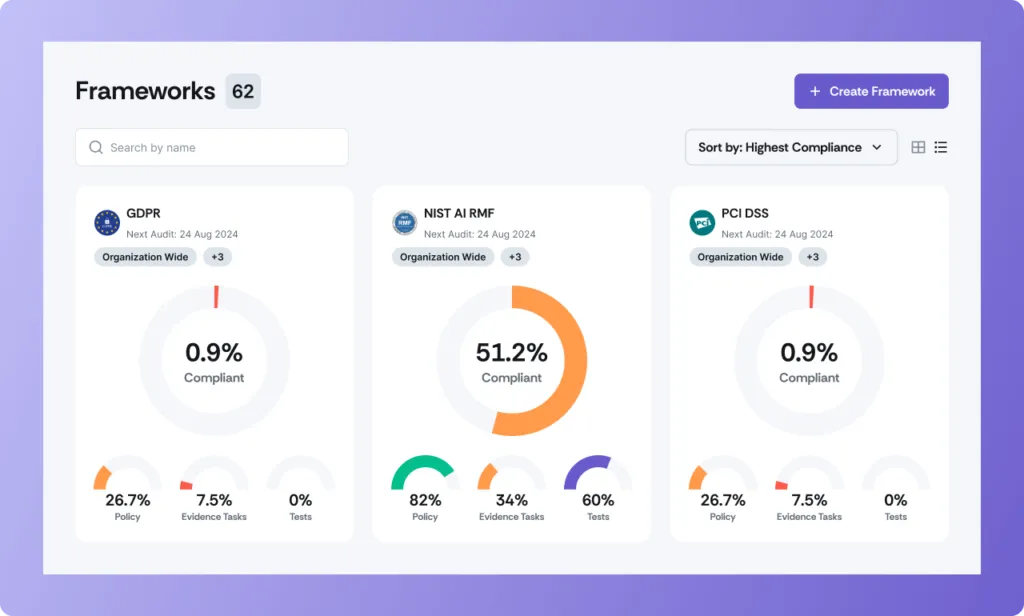
- Document management: Scrut offers a policy hub with over 50 expert-vetted, GDPR-compliant policies. Organizations can leverage these pre-built policies or upload their own, ensuring that documents such as DPIAs and Article 30 records are up-to-date and easily accessible.
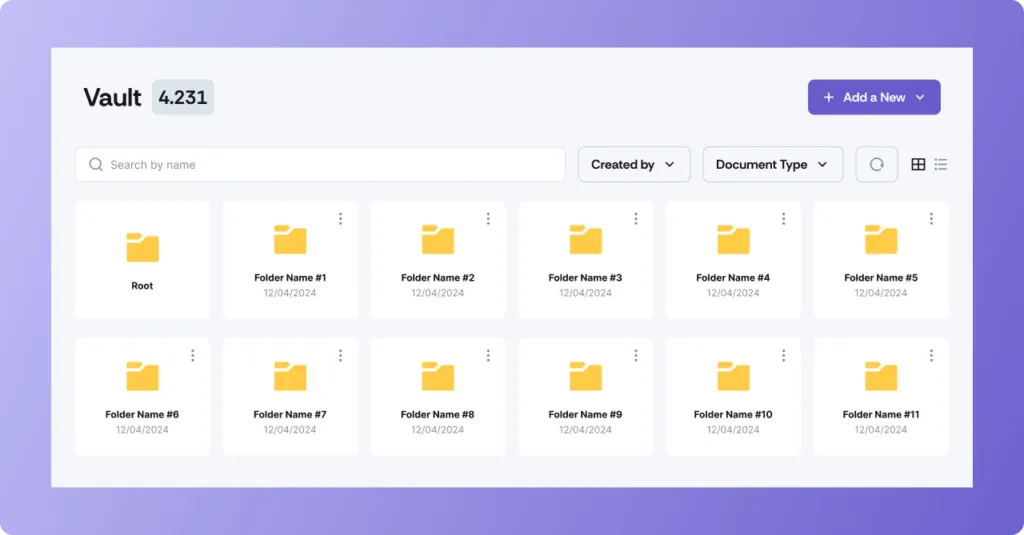
- Collaboration tools: Scrut facilitates seamless collaboration between internal teams and auditors by allowing organizations to invite auditors to the platform. This feature streamlines the audit process by enabling real-time management and eliminating the need for extensive email exchanges and file sharing.
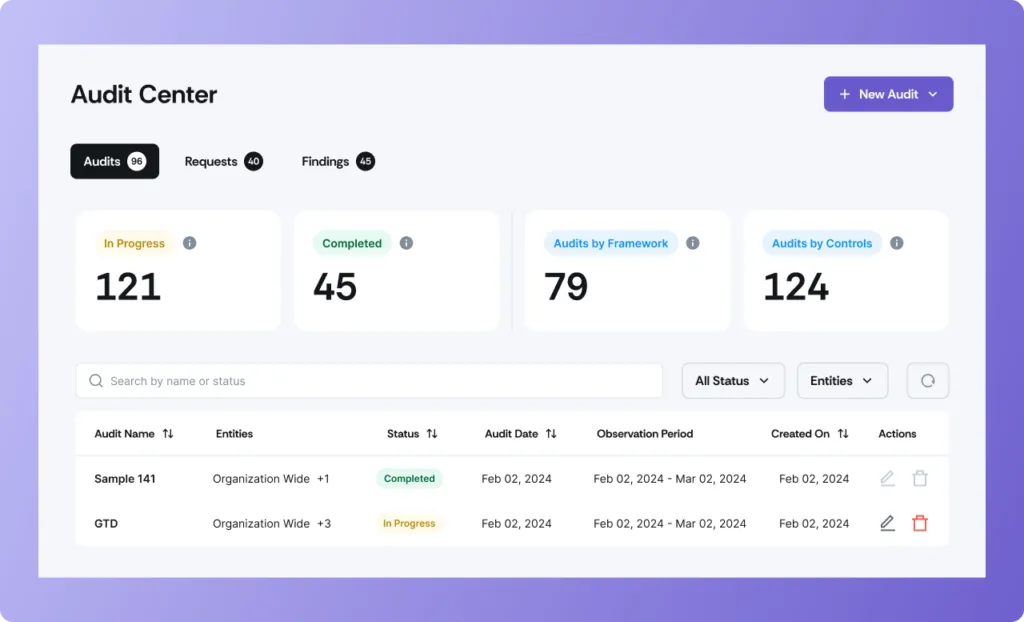
Why Scrut is different:
- Tailored for growing organizations: Scrut is designed to cater to the needs of growing organizations managing complex data ecosystems, providing scalable solutions that evolve with business expansion.
- Scalable compliance efforts: The platform supports multiple compliance frameworks, allowing businesses to manage various standards as they grow and their compliance requirements become more complex.
- Access to experts: Scrut offers access to compliance experts who provide personalized guidance throughout the audit and compliance journey. These experts help interpret regulations, address specific challenges, and ensure that the organization's compliance posture is robust and audit-ready.
- Auditor selection made easy: Scrut provides a curated selection of GDPR compliance auditors, allowing organizations to choose the GDPR auditor best suited to their needs and ensuring a seamless audit process.
- Proven success: Scrut has a track record of guiding companies through seamless GDPR audits, minimizing disruptions, and ensuring compliance.
Case study:
Scrut Automation has effectively assisted various organizations in achieving GDPR compliance with minimal disruptions. For instance, TraceX, an India-based blockchain-powered digital agriculture platform, leveraged Scrut's platform to automate cloud infrastructure observability and evidence collection. This approach enabled TraceX to build an information security posture compliant with GDPR efficiently, despite limited dedicated compliance resources.
Read also: Scrut Automation featured on the Fortune Cyber 60 List!
Section 6: Preparing for a GDPR audit
Preparing for a GDPR audit can seem challenging, but with a clear plan and understanding of the process, organizations can navigate it confidently. This section outlines key readiness steps and what to expect during the audit.
Internal readiness checklist
Ensuring preparedness for a GDPR audit involves having critical documentation and practices in place. Use this checklist to gauge your readiness:
- Inventory of processing activities (Article 30 Records): Maintain a detailed inventory of all data processing activities as required under Article 30 of the GDPR. This includes the purpose of processing, categories of data, retention periods, and security measures in place.
- Security measures and incident response protocols: Implement and document robust technical and organizational security measures, such as encryption, access controls, and regular vulnerability assessments. Develop clear incident response protocols to manage and report breaches effectively.
- Employee training records and data protection awareness initiatives: Ensure employees are trained in GDPR principles, and maintain records of these training sessions. Continuous awareness initiatives are essential to embed a culture of compliance across the organization.
What to expect during a GDPR audit
- Onsite visits: Auditors may conduct onsite assessments to verify compliance measures. This includes physical inspections of data storage systems and facilities.
- Interviews with key personnel: Auditors will engage with key personnel, such as Data Protection Officers (DPOs), IT managers, and legal teams, to understand compliance practices and resolve any ambiguities.
- System reviews: To confirm alignment with GDPR requirements, a thorough examination of IT systems, data flows, and processing activities will be carried out.
Post-audit deliverables
- Audit reports: A detailed report outlining the audit findings, including areas of compliance and non-compliance.
- Risk mitigation plans: Recommendations for addressing identified gaps, such as implementing additional security measures or updating policies.
- Compliance roadmaps: A structured plan to guide the organization toward achieving or maintaining GDPR compliance, including timelines and key action items.
Pro Tip: Leverage platforms like Scrut Automation to streamline audit preparation, centralize compliance documentation, and monitor GDPR adherence in real-time.

Read also: Automation in GDPR Compliance: Chasing Efficiency and Accuracy
Section 7: The return on investment (ROI) of a GDPR audit
A GDPR audit is more than just a compliance requirement; it delivers significant value to organizations by mitigating risks and enhancing operational resilience. Here's how investing in a GDPR audit provides both immediate and long-term returns.
Tangible benefits:
- Reduced risk of fines and sanctions: Achieving GDPR compliance minimizes the likelihood of penalties resulting from non-compliance, safeguarding your organization from financial and reputational damage.
- Enhanced trust with customers and stakeholders: Demonstrating a commitment to data protection builds confidence among customers, partners, and investors, fostering stronger relationships and competitive advantage.
Long-term value:
- Strengthened data governance: A GDPR audit drives improvements in data management practices, ensuring data integrity, security, and efficient processes across the organization.
- Future-proofing compliance: By addressing current requirements and establishing robust systems, your organization is better prepared to adapt to evolving regulations and maintain compliance with minimal disruption.
Read also: Best Practices for Automating GDPR Compliance
Wrapping up
Achieving and maintaining GDPR compliance is not just a regulatory requirement but a strategic imperative in today's data-driven economy. By understanding the complexities of GDPR, engaging with a qualified GDPR auditor, and leveraging advanced tools like Scrut Automation, organizations can navigate compliance challenges effectively while reaping long-term benefits.
Beyond avoiding penalties, GDPR compliance builds trust, strengthens data governance, and positions organizations as leaders in responsible data management. With proactive measures, expert guidance from a trusted GDPR auditor, and the right support, your organization can turn GDPR compliance into a catalyst for growth and resilience in a rapidly evolving digital landscape.
Streamline GDPR compliance with Scrut
Achieve effortless GDPR compliance with automation, real-time monitoring, and expert support. Book a Demo today!
FAQs
How often should GDPR audits be conducted? GDPR audits should be conducted regularly to ensure ongoing compliance. While there's no specific timeline mandated, many organizations perform annual audits. However, audits are especially critical during significant business changes, such as launching new products, entering GDPR-regulated markets, or implementing advanced data processing technologies.
How do you perform a GDPR compliance audit? A GDPR compliance audit involves the following steps:
Data mapping: Document all personal data collected, processed, and stored.
Gap analysis: Identify areas of non-compliance with GDPR requirements.
Review policies and procedures: Examine privacy policies, data protection agreements, and security protocols.
Assess risks: Conduct Data Protection Impact Assessments (DPIAs) for high-risk activities.
Verify documentation: Ensure all records, such as Article 30 processing records, are accurate and up-to-date.
Compile audit findings: Create a report outlining compliance gaps, risks, and recommended actions.
Who must demonstrate compliance with GDPR? Any organization that collects, processes, or stores personal data of EU residents must demonstrate compliance with GDPR, regardless of the organization's location. This includes businesses, non-profits, and government entities handling personal data for any purpose.
Are GDPR audits mandatory? While GDPR does not explicitly mandate audits, organizations are required to demonstrate compliance and accountability. Conducting regular GDPR audits is a best practice to ensure adherence to the regulation and avoid fines or reputational damage. Regulatory authorities may request an audit during investigations or after data breaches.
Who is exempt from GDPR compliance? GDPR compliance applies broadly to all entities handling EU residents' personal data. However, it does not apply to:
Purely personal or household activities: Individuals processing data for personal purposes, like maintaining contact lists.
Organizations outside the EU: If they neither offer goods or services to EU residents nor monitor their behavior.
However, these exemptions are narrow, and most businesses engaging with EU residents must comply.
What is the role of a GDPR auditor? A GDPR auditor is a professional or organization specializing in assessing a company's compliance with the GDPR. Their role involves reviewing policies, processes, and systems to ensure they meet GDPR requirements. This includes evaluating data processing activities, security measures, incident response plans, and employee training.
A GDPR compliance auditor provides actionable recommendations to address any gaps and prepares the organization for potential regulatory audits. By working with a GDPR auditor, companies can proactively identify risks, strengthen their compliance posture, and build trust with stakeholders.



